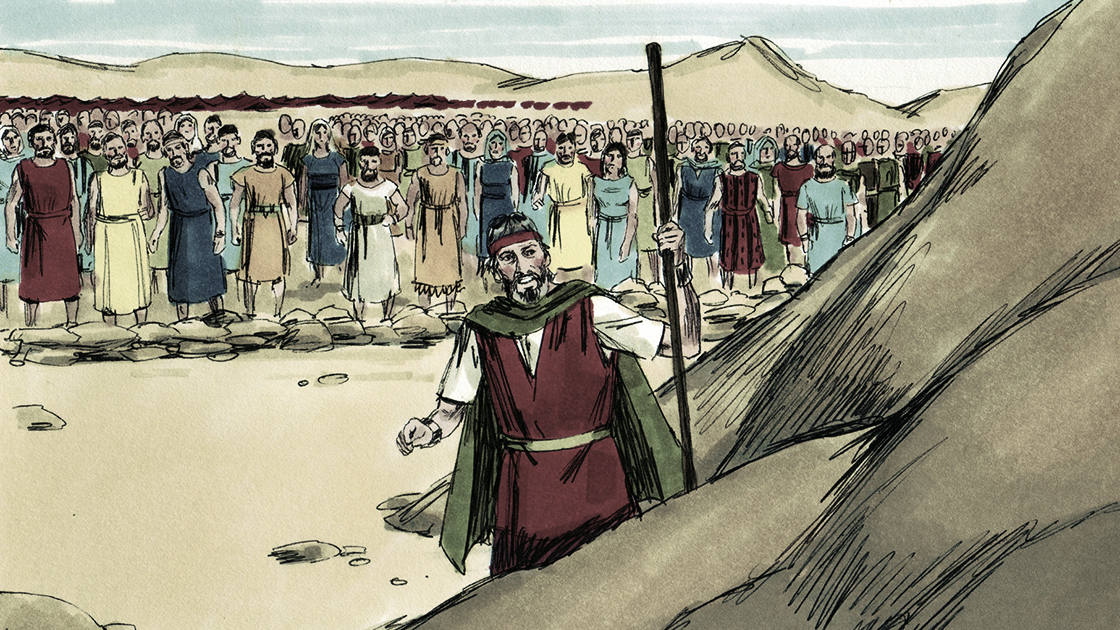https://www.pcog.org/articles/2812/moses-king-prophet-priest
Moses the King
There is an incredible aspect to Moses’s office in Israel that should be very inspiring for us. He was both a king and a prophet, a statesman and a religious leader. “Moses commanded us a law, even the inheritance of the congregation of Jacob. And he was king in Jeshurun, when the heads of the people and the tribes of Israel were gathered together” (Deuteronomy 33:4-5). Jeshurun is a poetic name for Israel, and it means upright, just or straight. In the office of king, Moses welded the 12 tribes of Israel into God’s chosen nation. Yet even in this effort, Moses was merely the mediator between God and the people.
Exodus 18 to 24 present a written record of the governmental, legal and judicial systems God established through Moses. These chapters are the heart of Israel’s glorious constitution. “Hearken now unto my voice, I will give thee counsel, and God shall be with thee: Be thou for the people to God-ward, that thou mayest bring the causes unto God: And thou shalt teach them ordinances and laws, and shalt shew them the way wherein they must walk, and the work that they must do,” advised Moses’s father-in-law (Exodus 18:19-20). Jethro did not establish Israel’s governmental structure. Study verse 19: Jethro admitted that he gave Moses counsel on how to rule. Yet he recognized that God would have to sanction his advice; study verse 23.
Israel’s system of judges was established by Jethro’s counsel to Moses (verses 21 -22). However, it is clear that Moses was always the top leader, or king, of the nation. In the same sense, God’s chief apostle is king over the Church, the spiritual nation of Israel (Matthew 16:18-19). God’s principle of government is the same for every age. Man can experiment with any form of government he chooses—but it will always fail. The Laodiceans are experimenting with government. Their plans will fail. The pcg stands alone in embracing God’s government outlined in Exodus 18 and restored to the Church through Mr. Armstrong. In doing so, we have been given blessing after blessing. The pcg is living proof that only God’s government works.
Moses The Prophet
While some Bible scholars and intellectuals argue that Moses was a mythical hero, the greatest statesman of our time, Winston Churchill, believed that Moses lived and was God’s prophet. He wrote an excellent essay on: “Moses: The Leader of a People.” This essay was first published in the Sunday Chronicle on Nov. 8, 1931, under the headline, “Great Bible Stories Retold by the World’s Best Writers.” You can find it on the Internet.
“[The] closing words of the book of Deuteronomy are an apt expression of the esteem in which the great leader and liberator of the Hebrew people was held by the generations that succeeded him,” wrote Churchill, sharing the Hebrews’ same esteem for Moses. “He was the greatest of the prophets, who spoke in person to the God of Israel; he was the national hero who led the chosen people out of the land of bondage, through the perils of the wilderness, and brought them to the very threshold of the Promised Land ….” Mr. Churchill was a student of history. We can safely speculate that he carefully studied Moses’s life as told in the Bible. Moses faced the same kind of nagging problems that Mr. Churchill faced in his long political career. He faced and fought—almost alone—the Nazi tyranny of the 1930s and ’40s. Moses had to face and overcome Pharaoh, the tyrant of his day.
Jesus Christ credited Moses with writing the first five books of the Bible (Luke 24:25-27). These books are chock-full of prophecy, much of it still to be fulfilled in our day. Study Leviticus 26 and Deuteronomy 28. These two chapters are a window to our world. They explain what is happening to the modern nations of Israel and show us the importance of Moses’s long life.
Moses the Priest
Moses also fulfilled a priestly function in ancient Israel. The deacon Stephen confirms this: “This is that Moses, which said unto the children of Israel, A prophet shall the Lord your God raise up unto you of your brethren, like unto me; him shall ye hear. This is he, that was in the church in the wilderness with the angel which spake to him in the mount Sina, and with our fathers: who received the lively oracles to give unto us” (Acts 7:37-38). Moses was not only king and prophet, but also a priest. How do we know that?
Moses ruled over not only the nation of Israel, but also the “congregation,” or church, of Israel (e.g. Exodus 12:3, and many other verses). Mr. Armstrong taught God’s Church for years that ancient Israel was both church and state.
Moses’s life is so astounding, we should be thrilled and excited to study it. As chief executive, he saw to Israel’s physical needs and security, and he safeguarded the nation’s spiritual security. The central part of the book of Deuteronomy consists of Moses’s final three sermons to the nation. Considering Israel’s 40 years wandering in the wilderness, how many sermons did Moses give of which we have no written record? Just count 40 years worth of sabbaths and high days—Moses could have given thousands of messages.
There is much we can and should learn from Moses. Let’s not forget our glorious, soon-coming future. “And hath made us kings and priests unto God and his Father; to him be glory and dominion for ever and ever. Amen” (Revelation 1:6). God has already made us kings and priests. Soon we will be ruling with Him—just like Moses did millennia ago.


No comments:
Post a Comment